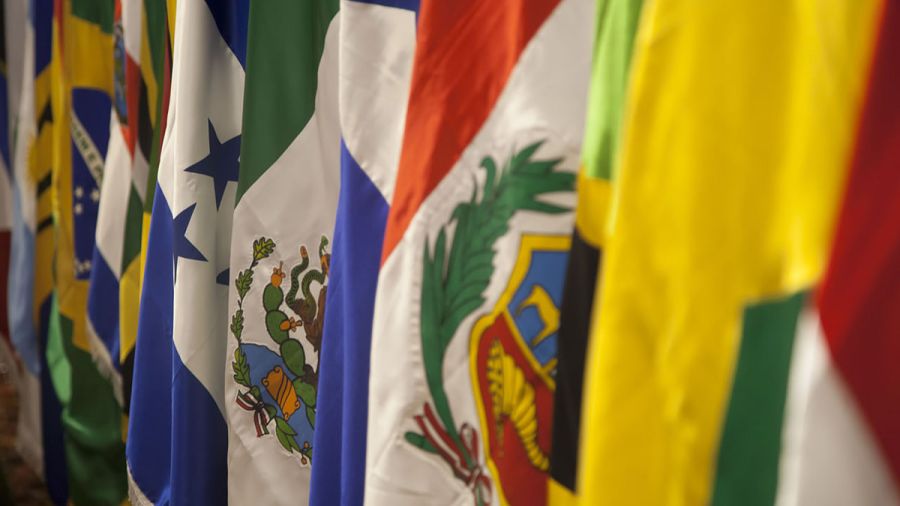Status of Bitcoin adoption in Latin America
Bitcoin advocates in Latin America are racing to follow El Salvador’s lead, but legislative efforts have made little progress so far.
The acceptance of Bitcoin as a legal currency in El Salvador at the Miami 2021 Bitcoin conference has caught the attention of Latin American lawmakers. That’s not surprising, given the region’s long history of underdevelopment and turbulent politics, and the inability of its people to participate in the global financial system, with too many unbanked families.
With its digital ubiquity and lack of centralization, Bitcoin and DeFi are becoming more attractive in a region of the world eager to improve its fortunes.
El Salvador’s Bitcoin law went from announcement to approval in just five days, courtesy of President Nayib Bukele. Now, authorities in several other Latin American nations are considering their own Bitcoin adoption initiatives.
Other leaders join the Bitcoin adoption
Politicians in Latin America have embraced bitcoin after El Salvador’s extraordinary declaration of bitcoin as legal currency.
The leaders of Argentina, Brazil, Panama and Paraguay have shown interest in the digital currency in recent days, with some indicating that they would take steps to help the growth of Bitcoin use.
Como ya lo decía hace un buen tiempo, nuestro país necesita avanzar de la mano de la nueva generación.
— Carlitos Rejala 🙏🇵🇾🙌 (@carlitosrejala) June 7, 2021
Llegó el momento, nuestro momento.
Esta semana empezamos con un proyecto importante para innovar a Paraguay frente al mundo!
El verdadero to the moon 🚀#btc & #paypal pic.twitter.com/ZMRJgAIxgO
Carlos Rejala, a 36-year-old member of the Paraguayan Chamber of Deputies, was one of the first vocal advocates of El Salvador’s Bitcoin legislation. Rejala is a rookie in politics, having entered politics in 2018 as a member of the country’s fledgling Hagamos Party.
He took to social media to express his support for El Salvador’s Bitcoin legislation and announced the launch of “a major initiative to revitalize Paraguay this week.”
Gabriel Silva from Panama, who may have been concerned about losing his country’s status as the financial center of Central America, tweeted two days after Bukele his support for the adoption of Bitcoin.
“The moment has come, our moment.”
Carlos Rejala
Silva is an independent congressman who is not affiliated with the country’s party political machine and therefore has a slim chance of enacting such legislation in the near future.
Clearly, opinions about cryptocurrency risk differ between strong countries and those that have historically been exposed to monetary policy volatility and hyperinflation.
Argentina, for example, is in a different but more dangerous position because it produces its own money, but too much, resulting in years of rampant inflation.
Panama is similar to El Salvador in that it does not have its own currency, but depends on the dollar.
El Salvador’s decision to accept bitcoin as legal money may have ramifications beyond the country’s borders, serving as a model for other nations interested in adopting cryptocurrency but not sure how. This is a positive development for cryptocurrency and may herald the future acceptance of digital currencies in emerging countries globally, although central banks and governments of strong economies have so far been hesitant to join them.
Bitcoin adoption status in Latin America by country
Here’s an overview of where each of these nations stands on their crypto journeys:
Argentina
On June 7, Francisco Sánchez, national deputy representing the city of Neuquén in Argentina, published a photo of himself with laser eyes. Argentina has given no indication that any legislation on Bitcoin is being prepared.
Brazil
Fábio Ostermann and Gilson Marques, two Brazilian lawmakers, updated their profile photos to include laser eyes to show their support for Bitcoin. Marques stood out for becoming the first legislator in the Brazilian Chamber of Deputies to proclaim: “Taxes are theft.”
There is currently no evidence that any Bitcoin law is being considered in Brazil.
Colombia
Jehudi Castro, who previously served as Colombia’s Vice Minister of Digital Economy, is currently a presidential advisor. Castro is a supporter of both Bitcoin and DeFi and recently said, “DeFi is an incredible opportunity and Colombia is ready to seize it.”
While no legislation is currently being considered for the official adoption of Bitcoin, the Superintendency of Corporations of Colombia, the government’s official corporate watchdog, confirmed in January that corporations can legally buy Bitcoin.
Ecuador
Julio Eduardo Clavijo Acosta, Vice Minister of Economic Inclusion of Ecuador, updated his profile photo to include laser eyes. There is no evidence that Ecuador is considering any Bitcoin laws.
Mexico
Indira Kempis Martínez and Eduardo Murat Hinojosa, both senators, recently updated their profile photos to include laser eyes. Hinojosa said he will introduce legislation in Mexico’s lower house that supports a crypto framework.
Notably, Bitso became Latin America’s first crypto unicorn after raising $ 250 million in a Series C funding round and reaching a valuation of $ 2.2 billion.
Panama
“Panama cannot be left behind,” said Gabriel Silva, a member of the National Assembly of Panama, in reaction to Bukele’s statement on June 7. Silva said that he will submit a formal request to the Panamanian government requesting support for cryptocurrencies.
Silva followed up on June 9 with a public link to a Telegram channel seeking thoughts, recommendations, and views from anyone interested in assisting in the development of Panama’s Bitcoin adoption plan.
Paraguay
Carlos Rejala, a congressman, has been a vocal advocate for Bitcoin adoption. Rejala posted a photo of himself with laser eyes after Bukele’s statement on June 6. “This week, we are launching an important initiative to show Paraguay to the world!” he tweeted, with the hashtag “#btc.”
On June 9, after the approval of the legislation in El Salvador, Rejala informed Coindesk that he intends to introduce a law in July aimed at attracting crypto companies, particularly mining operations, to Paraguay.
CryptoPress
Bitcoin advocates in Latin America are racing to follow El Salvador’s lead, but legislative efforts have made little progress so far.
The acceptance of Bitcoin as a legal currency in El Salvador at the Miami 2021 Bitcoin conference has caught the attention of Latin American lawmakers. That’s not surprising, given the region’s long history of underdevelopment and turbulent politics, and the inability of its people to participate in the global financial system, with too many unbanked families.
With its digital ubiquity and lack of centralization, Bitcoin and DeFi are becoming more attractive in a region of the world eager to improve its fortunes.
El Salvador’s Bitcoin law went from announcement to approval in just five days, courtesy of President Nayib Bukele. Now, authorities in several other Latin American nations are considering their own Bitcoin adoption initiatives.
Other leaders join the Bitcoin adoption
Politicians in Latin America have embraced bitcoin after El Salvador’s extraordinary declaration of bitcoin as legal currency.
The leaders of Argentina, Brazil, Panama and Paraguay have shown interest in the digital currency in recent days, with some indicating that they would take steps to help the growth of Bitcoin use.
Como ya lo decía hace un buen tiempo, nuestro país necesita avanzar de la mano de la nueva generación.
— Carlitos Rejala 🙏🇵🇾🙌 (@carlitosrejala) June 7, 2021
Llegó el momento, nuestro momento.
Esta semana empezamos con un proyecto importante para innovar a Paraguay frente al mundo!
El verdadero to the moon 🚀#btc & #paypal pic.twitter.com/ZMRJgAIxgO
Carlos Rejala, a 36-year-old member of the Paraguayan Chamber of Deputies, was one of the first vocal advocates of El Salvador’s Bitcoin legislation. Rejala is a rookie in politics, having entered politics in 2018 as a member of the country’s fledgling Hagamos Party.
He took to social media to express his support for El Salvador’s Bitcoin legislation and announced the launch of “a major initiative to revitalize Paraguay this week.”
Gabriel Silva from Panama, who may have been concerned about losing his country’s status as the financial center of Central America, tweeted two days after Bukele his support for the adoption of Bitcoin.
“The moment has come, our moment.”
Carlos Rejala
Silva is an independent congressman who is not affiliated with the country’s party political machine and therefore has a slim chance of enacting such legislation in the near future.
Clearly, opinions about cryptocurrency risk differ between strong countries and those that have historically been exposed to monetary policy volatility and hyperinflation.
Argentina, for example, is in a different but more dangerous position because it produces its own money, but too much, resulting in years of rampant inflation.
Panama is similar to El Salvador in that it does not have its own currency, but depends on the dollar.
El Salvador’s decision to accept bitcoin as legal money may have ramifications beyond the country’s borders, serving as a model for other nations interested in adopting cryptocurrency but not sure how. This is a positive development for cryptocurrency and may herald the future acceptance of digital currencies in emerging countries globally, although central banks and governments of strong economies have so far been hesitant to join them.
Bitcoin adoption status in Latin America by country
Here’s an overview of where each of these nations stands on their crypto journeys:
Argentina
On June 7, Francisco Sánchez, national deputy representing the city of Neuquén in Argentina, published a photo of himself with laser eyes. Argentina has given no indication that any legislation on Bitcoin is being prepared.
Brazil
Fábio Ostermann and Gilson Marques, two Brazilian lawmakers, updated their profile photos to include laser eyes to show their support for Bitcoin. Marques stood out for becoming the first legislator in the Brazilian Chamber of Deputies to proclaim: “Taxes are theft.”
There is currently no evidence that any Bitcoin law is being considered in Brazil.
Colombia
Jehudi Castro, who previously served as Colombia’s Vice Minister of Digital Economy, is currently a presidential advisor. Castro is a supporter of both Bitcoin and DeFi and recently said, “DeFi is an incredible opportunity and Colombia is ready to seize it.”
While no legislation is currently being considered for the official adoption of Bitcoin, the Superintendency of Corporations of Colombia, the government’s official corporate watchdog, confirmed in January that corporations can legally buy Bitcoin.
Ecuador
Julio Eduardo Clavijo Acosta, Vice Minister of Economic Inclusion of Ecuador, updated his profile photo to include laser eyes. There is no evidence that Ecuador is considering any Bitcoin laws.
Mexico
Indira Kempis Martínez and Eduardo Murat Hinojosa, both senators, recently updated their profile photos to include laser eyes. Hinojosa said he will introduce legislation in Mexico’s lower house that supports a crypto framework.
Notably, Bitso became Latin America’s first crypto unicorn after raising $ 250 million in a Series C funding round and reaching a valuation of $ 2.2 billion.
Panama
“Panama cannot be left behind,” said Gabriel Silva, a member of the National Assembly of Panama, in reaction to Bukele’s statement on June 7. Silva said that he will submit a formal request to the Panamanian government requesting support for cryptocurrencies.
Silva followed up on June 9 with a public link to a Telegram channel seeking thoughts, recommendations, and views from anyone interested in assisting in the development of Panama’s Bitcoin adoption plan.
Paraguay
Carlos Rejala, a congressman, has been a vocal advocate for Bitcoin adoption. Rejala posted a photo of himself with laser eyes after Bukele’s statement on June 6. “This week, we are launching an important initiative to show Paraguay to the world!” he tweeted, with the hashtag “#btc.”
On June 9, after the approval of the legislation in El Salvador, Rejala informed Coindesk that he intends to introduce a law in July aimed at attracting crypto companies, particularly mining operations, to Paraguay.
© 2024 Cryptopress. For informational purposes only, not offered as advice of any kind.
Latest Content
- Crypto Market Update: April 25, 2024
- Renzo’s Restaked ETH Depegs to $700: DeFi Platforms Gearbox and Morpho Face Liquidations
- Crypto Market Update: Insights and Trends for April 23, 2024
- On April 24, the $RTF Token from Oleksandr Usyk’s READY TO FIGHT Project Will be Listed on WhiteBIT
- Crypto Market Update: Key Trends and Insights for April 22, 2024
Related
- Crypto Events Archive A growing list of past crypto and blockchain events from around the world. Conferences, workshops, meetups, hackathons, conferences....
- 5 Brokers that operate with cryptocurrencies in Latin America 5 Brokers that operate with cryptocurrencies in Latin America....
- Covid effect helps the adoption of cryptocurrencies in Latin America, registers 7% participation worldwide "The increase in liquidity due to the macroeconomic measure QE will allow converting that money into cryptocurrencies", CZ, CEO of Binance The world's largest exchange increased the incorporation of institutional clients by 60% during Q3 2020...
- Iván Marchena departs after establishing PrimeXBT in the region. Iván Marchena, the man behind PrimeXBT’s award-winning Bitcoin-based trading platform’s success in Latin America, has agreed to step down as vice president of operations for the area after achieving the goals set out at the start of his term. The...




